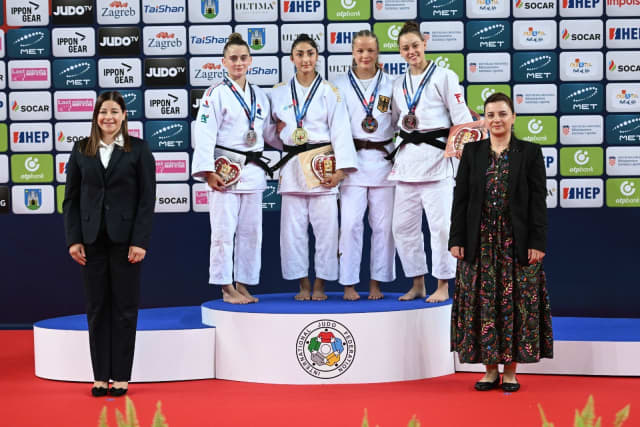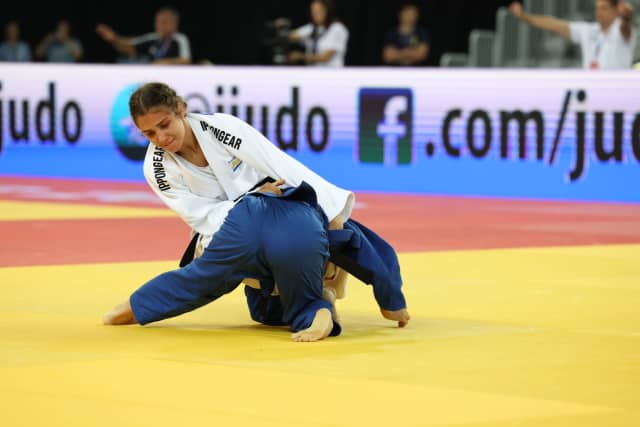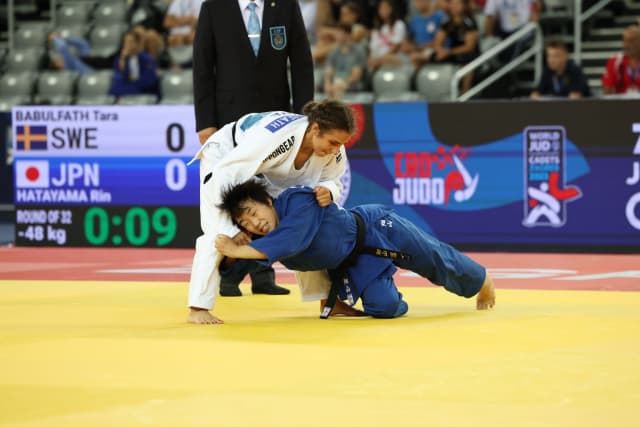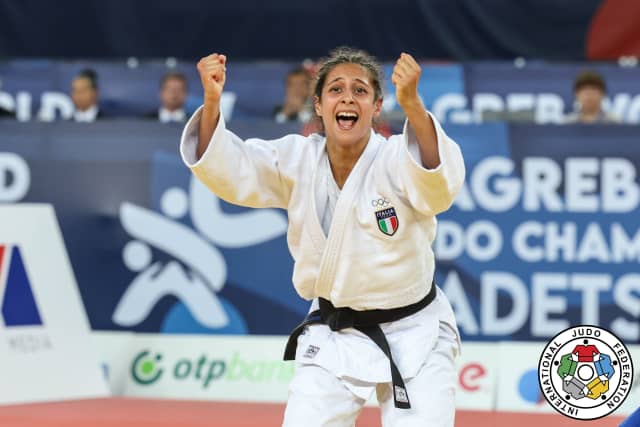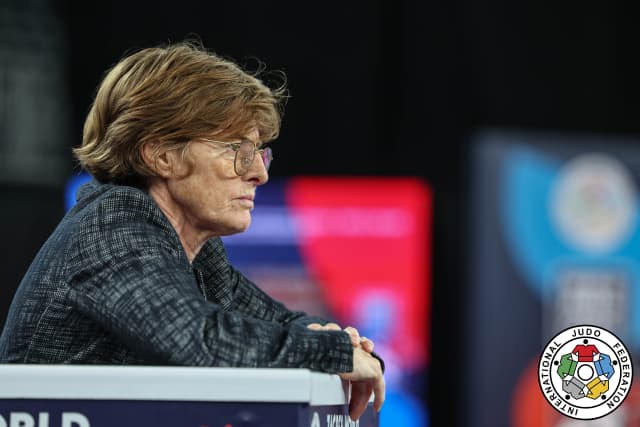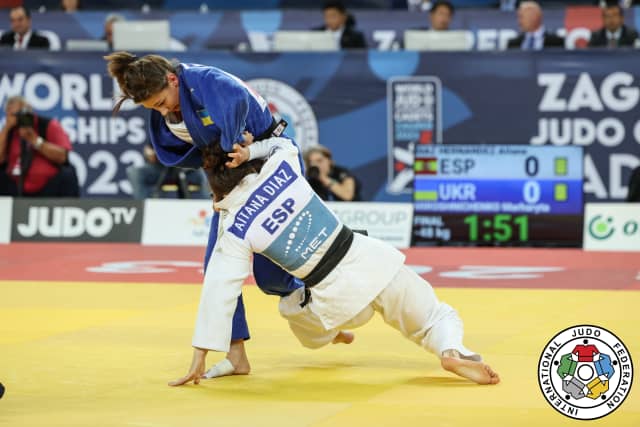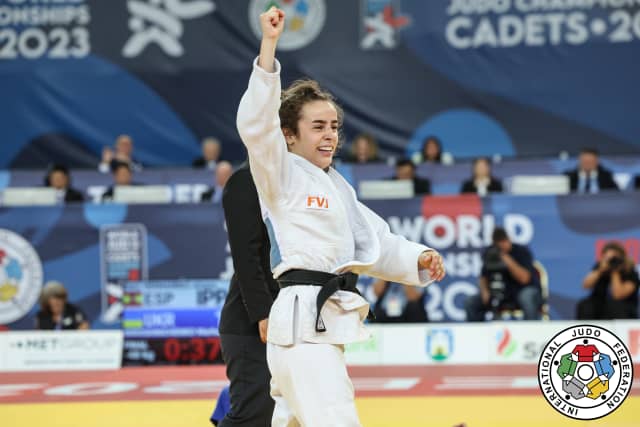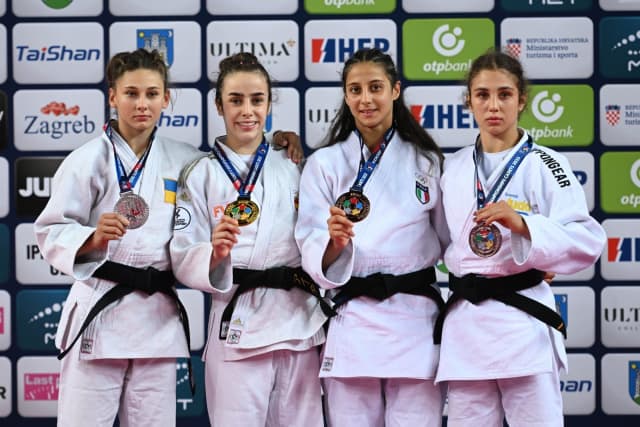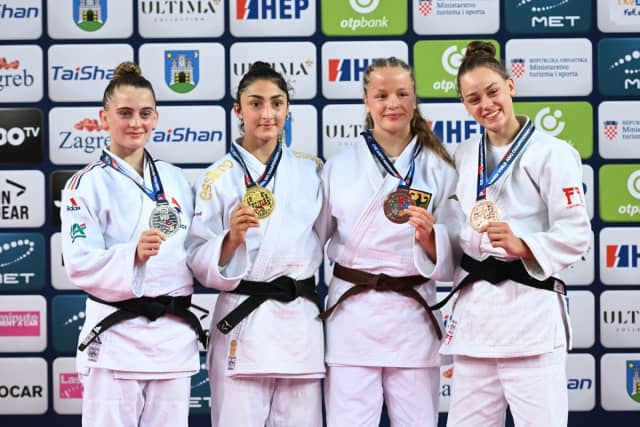Last year Babulfath won the Europeans but fell one place short of her goal, becoming world cadet silver medallist in Sarajevo. Here in Zagreb she had a score to settle after the first couple of rounds she looked perfectly on track.
Her first contest of the day, in the second round, was an unfortunate draw for either Tara or for the unseeded Japanese judoka, Hatayama. Many of the Japanese competing in Zagreb haven’t any other reference on the -18 World Tour, still arriving though with highly technical judo and the foundations in place to be able to win both now and in the future. Babulfath is in another league and even the Japanese couldn’t handle her mature and capable presence.
Once the Japanese challenge was out of the way, it looked like a clear run to gold for the Swede. That wasn’t the case though as judo at all levels will forever throw up anomalies, opportunities, unknown quantities and impressive artistic displays of fortitude. Babulfath didn’t envisage meeting her friend Diaz Hernandez (ESP) in the semi-final. They know each other well and the Spanish fighter wasn’t ready to accept defeat. She worked, as any judoka must and won on penalties, carefully, methodically and skilfully. Babulfath was relegated to the bronze medal contest, not reaching the top spot, for the second year running.
Meeting Diaz Hernandez in the final was Miroshnichenko (UKR), unseeded and unfazed. In each round she took no time at all to get into her stride. The -48 kg category competitors didn’t do their research because this Ukrainian is well known at -44 kg, with 6 Tour medals under her belt there.
In the uncomfortable position to be facing Babulfath for bronze was up-and-coming Uzbek Zarina Jamalova, the determined powerhouse who took out the number two seed earlier in the day and was only beaten in the quarter-final by Jamsran (MGL), whose last contest of the day would be for the other bronze medal.
Jamsran led by waza-ari in her medal fight against Storione (ITA) until the very last second, under the pressure of penalties throughout but weathering the storm. The Italian didn’t let her energy drop at all and at 3:59 on the clock she popped a beautifully placed ko-uchi-gari under the Mongolian and scored ippon. This was an excellent display of perseverance.
Babulfath and Jamalova then came to the tatami. Each attacked, each avoided but the clear difference was the transition phase of each exchange. The Swedish judoka is known for her ability on the ground and for this medal she gave it everything , holding the Uzbek for ippon. She and her coach, 1980 world champion Jane Bridge, nodded and completed their day. It’s a rostrum finish even if not the one she planned.
In the final the Ukrainian followed through on her promise made at the lower category by throwing for waza-ari against Diaz Hernandez very early on. It looked she would hold the score too but the Spaniard had other ideas and used a patient and excellently applied turnover to find ippon a different way and become world cadet champion.
After receiving her gold medal, Diaz Hernandez said, “At the beginning of the day I just thought about the first fight and then I moved on to thinking about the next. That was my way to take the gold. I enjoyed the day a lot as it’s my last cadet competition and I finished very well with the strongest end to the year.”
Spain defies the odds - Aitana Diaz Hernandez 🇪🇸🥇
— Judo (@Judo) August 24, 2023
Follow all the action on https://t.co/vnVSOXSCT5 📺#JudoCadets #Zagreb #Croatia #Sport #Judo pic.twitter.com/neXyfdvrtp
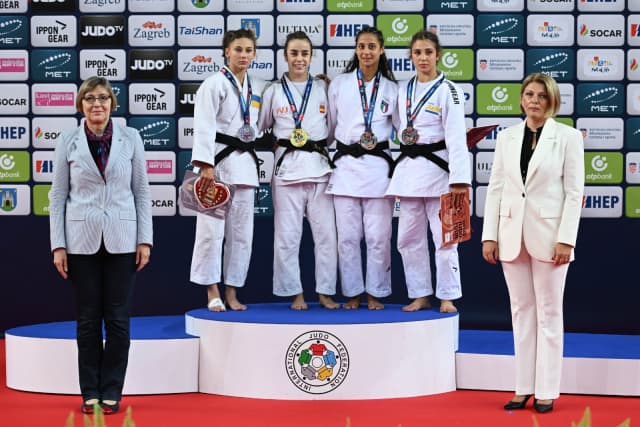
Final (-48 kg)
Bronze Medal Fights (-48 kg)
Final Results (-48 kg)
Alyssia Poulange (FRA) is the big name at -52 kg. She is the current European cadet champion and has medalled at every event she has entered this year. She is making perfect progress having won bronze at last year’s continentals and placed 7th at the 2022 worlds. To get to the quarter-final she had to pass her teammate Alicia Marques, also seeded, and pass her she did.
Egyptian Nada Fayiz Ali was the number two seed of the category but she feel at the first hurdle to Korean Jiho Baek. The Korean then lost to Toszegi (GER) who made it to the semi-final without too much of a problem.
In their respective semi-finals, Poulange beat strong Spanish opposition in the name of Adriana Saez Hevia, who then dropped into the bronze medal contest to face Brazilian Rafaela Rodrigues, while Toszegi lost to Gadashova (AZE) to then have to take on Marques for the bronze after the French athlete won her repechage final against Georgieva (BUL).
The first bronze went to the German when she felt exactly the right moment, perhaps against the tide, to put in an enormous seoi-nage, which scored ippon, without question. She released an equally enormous smile and deservingly so.
Spain are having an excellent day in the women’s categories. Following the victory of Diaz Hernandez in the lighter category, Saez Hevia won herself a world bronze medal, leading her medal match throughout, forcing her opponent to collect two shido and eventually throwing for waza-ari too.
In a very close final, it was Poulange who seemed to hold her nerve better, allowing the Azeri space to attack, without all the required elements, more often, while ensuring she attacked enough herself and also kept control in ne-waza. It was a good plan, especially with such a strong opponent. At 1:37 into golden score, the French athlete turned Gadashova over and held, catching the osaekomi, albeit for only a couple of seconds before the Azeri escaped. It was at that point that Poulange appeared to tire and she began to apply false attacks and at 2:48 into extra time came very close to being thrown with a semi-gaeshi. It was then 2:1 on penalties in favour of Gadashova. After a total of 7 minutes and 13 seconds Gadashova dropped underneath with a seoi-otoshi and rolled Poulange for waza-ari to take the gold.
Azerbaijan keeps the medals coming - Khadizha Gadashova 🇦🇿🥇
— Judo (@Judo) August 24, 2023
Follow all the action on https://t.co/vnVSOXSCT5 📺#JudoCadets #Zagreb #Croatia #Sport #Judo pic.twitter.com/VAWF0hxGNF
Final (-52 kg)
Bronze Medal Fights (-52 kg)
